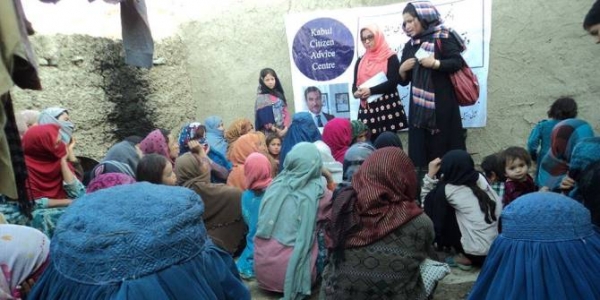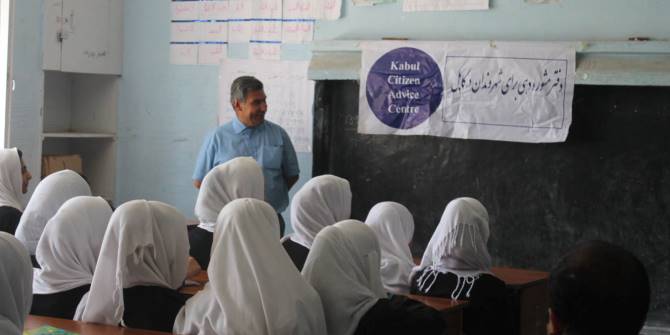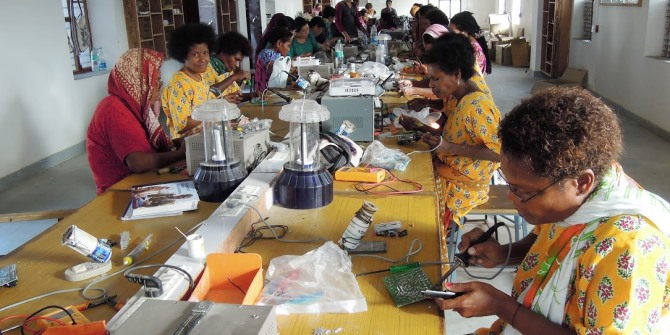
 Recently, the international community pledged $15.2 billion in aid to help Afghanistan until 2020, with the UK’s promising £750m, succeeding their previous contribution of £180m a year from 2011 to 2015. How can the UK ensure that this new round of government-funded aid meets its main objectives: value for money, the creation of a more stable country, and improvement of people’s lives? The Afghanistan and Central Asian Association’s Citizens Advice Centres provide a pertinent example, write Tevye Markson and Kiera Brodie. The key is in the development of institutional memory and communication between actors, so that lessons are learnt and shared.
Recently, the international community pledged $15.2 billion in aid to help Afghanistan until 2020, with the UK’s promising £750m, succeeding their previous contribution of £180m a year from 2011 to 2015. How can the UK ensure that this new round of government-funded aid meets its main objectives: value for money, the creation of a more stable country, and improvement of people’s lives? The Afghanistan and Central Asian Association’s Citizens Advice Centres provide a pertinent example, write Tevye Markson and Kiera Brodie. The key is in the development of institutional memory and communication between actors, so that lessons are learnt and shared.
The UK’s aid contribution to Afghanistan between 2011 and 2015 aimed to reach four key areas: governance and security, education, wealth creation and humanitarian assistance. However, these aims failed to recognise the spectrum and complexity of the problems facing Afghanistan in this period. In contrast, the 2016 pledge of aid has been much more focused in its objectives. For example, UK Aid Direct, a new programme aimed at providing NGOs with funding to support Afghanistan, is focussing on increasing female access to family planning and supporting the poorest, most vulnerable and hardest to reach women. The government has also pledged a higher percentage of aid to smaller organisations, hoping to encourage highly specified and focused projects and thus avoid overlap and waste. However, vague and imprecise objectives are not the only barrier to the success of foreign aid in Afghanistan. Projects face many difficulties on the ground including: security, reaching the most vulnerable, retaining knowledge, and corruption. These are barriers that hinder the ability for projects to provide value for money and meet government priorities.
The Afghanistan and Central Asian Association (ACAA) is a London-based charity dedicated to the integration of refugees and asylum seekers in the UK. They established two Citizens Advice Centres in Kabul and Pul-e-Khumri, in July 2013, with £249,460 in funding from the UK government. Based on the UK’s Citizens Advice Bureaus and believed to be the first of their kind in Afghanistan, these centres provided free, impartial and confidential advice to over 7,500 people between 2013 and 2016, from women to internally displaced people to returning refugees and others in or at risk of poverty. The Afghanistan and Central Asian Association faced these challenges and overcame many of them, while learning from those that proved the greatest barriers to supporting the most vulnerable in Afghanistan.
Richard Williams, a consultant specialising in UK and EU refugee and migration policy, recently completed an external evaluation of the project, concluding that it “far exceeded its expected outcomes” and provided “very good value for money”. The project provided 2000 individuals with legal advice regarding their rights, 65% of whom were women, and 79% of whom were unemployed. The project also enabled 1,949 individuals to gain access to basic health services and checks; enabled another 3,000 people to access outreach services on their rights; and increased education opportunities for almost 400 children and young people. The high number of beneficiaries demonstrates the Citizens Advice Centres’ success in tailoring their resources and opportunities to the specific needs of the communities in Kabul and Pul-e-Khumri.

The centres were also able to meet objectives that have been outlined by the government’s new aid programme, namely supporting the hardest to reach women. Through a grant from the Evan Cornish Foundation, the ACAA was able to extend its outreach to women’s prisons. Thus, the centres could provide legal support to women who were often imprisoned with their children due to ‘moral crimes’ such as running away or zina (sex outside marriage), so-called crimes which often occur as a result of forced marriages, rape and forced prostitution. In a display of distorted justice, victims of terrible crimes are treated as criminals themselves. The support that the Citizens Advice Centres provided was vital in helping extremely difficult to reach women. However, to create sustainable progression towards equal women’s rights wider changes must occur in both criminal law and the way it is practiced. The way that law is enacted is significant because as things stand punishment towards women goes beyond written law: running away without permission is not a crime under the Afghan criminal code and yet the Afghan Supreme Court has instructed its judges to treat women and girls who flee as criminals. Currently, support from NGOS for victimised women in Afghanistan is the best path available. However, in the long-term, support must be institutionalised into law, law enforcement, and local communities.
Often working without support from government and society can make it difficult for NGOs to reach some of the most vulnerable people in society. The disabled were the target group that the Citizens Advice Centres found it most difficult to reach. This was in large part due to the lack of disabled access in Afghanistan, preventing them from visiting centres. This is a problem that goes beyond the control of the ACAA, which is why it is vital that NGOs engage with a large network of organisations, so these issues reach governing bodies and political actors, hopefully leading to legislation for greater disabled access.
Security difficulties greatly affect the ability for NGOs to provide uninterrupted support in Afghanistan, so in order to be successful it is vital that they and their funders draw on and share knowledge. Towards the end of the ACAA’s pilot project, increased security threats made it difficult for young girls and women to attend classes, thus impacting the effectiveness of the scheme in its final stages. Project staff learnt that it was possible to appoint additional support from the Ministry of the Interior but by this point, the budget had already been. For future projects security will need to be established at a worst-case scenario level to ensure necessary funds are allocated to security from the beginning. This is one of the ‘lessons learnt’ that can help aid-funded projects to plan and, if shared with a network, ensure effective, uninterrupted activity throughout aid-funded projects in Afghanistan.

Some criticism has been directed at NGOs for simply ‘doing’ and neglecting to ‘learn’. While the Citizens Advice Centres were clearly active in ‘doing’, they also placed great emphasis on the learning process, as exemplified by Williams’ thorough external evaluation and the ACAA’s consistent commitment to working with a large network of organisations. The centres were partners with both the Ministry of Women’s Affairs and the Ministry of Refugees and Repatriation, while the ACAA is a member of the Afghan Women’s Network and Afghan Civil Society Forum. During this pilot project, the ACAA connected with over 50 governmental and non-government organisations including women’s shelters and criminal barristers. Where the centres could not provide a service themselves, they were able to refer clients to other service providers. For example, where family mediation broke down, they were able to refer women who were in danger to women’s shelters. Referrals to a large network of specialised service providers meant that the project avoided waste and overlap, often a plague of the provision of aid in Afghanistan. This enabled the centres to be responsive to the needs of the communities they served and attentive to the services they were most equipped to provide.
The learning process relies heavily on evaluation but also on the development of institutional memory: the collective knowledge and learned experiences of a group. NGOs often fail to appoint locally, missing the opportunity to tap into local knowledge and language skills. However, the greater worry is over knowledge that is not recorded. With commonly high turnover of foreign employees, organisations are losing worrying amounts of information, which damages sustainability. The Citizens Advice Centres largely employed locals and Afghan nationals ensuring learning, training and most skills gained during the project were retained locally. Organisations must do their best to ensure that employees are there for the long haul. Local employment not only stimulates sustainability; it also immediately provides the organisation with local knowledge that a foreign employee is unlikely to have.
Now is the ideal time to address this positive case study in light of the new funding announcement. The instability in Afghanistan is worsening, ‘driven by Taliban assaults on Afghan cities’ in 2016. In the first half of 2016, there were more than 1,600 deaths, the highest number since the UN began keeping records in 2009. Furthermore, Afghanistan is expecting the return of unlimited numbers of asylum seekers, a requisite of the new aid provision from EU member states. Having had their applications in Europe rejected, many of the asylum seekers are likely to be returning with feelings of resentment towards the West and facing poverty, which the Taliban may look to exploit. Many have already returned from Iran and Pakistan, including the famous green-eyed girl, and hundreds of thousands were told by the Pakistan government to leave by 15 November or face deportation. Given the deteriorating situation in Afghanistan, funding must go to projects that counteract disillusionment and reduce vulnerability in Afghan society. Projects such as the Citizens Advice Centres weaken the influence of the Taliban, through provision of services that provide sustainable opportunities, and discourage re-migration (often the choice for failed asylum seekers).
The aid pledged at the Brussels Conference helps to buy “four more years for Afghanistan”. If the UK and the rest of the international community can provide continuous funding for projects that offer value for money and avoid the pitfalls often associated with aid, we are likely to see positive growth in Afghanistan. The most important factor is not the amount of funding or the number of projects, but that the funding is effectively managed by organisations and given to the full spectrum of pertinent and vital projects. NGOs that apply for funding and the governing bodies that approve funding applications must understand and specify the measurable objectives that they aim to meet through the provision of aid. This will ensure that funded projects run parallel to the objectives of aid programmes, in part determining the success of foreign aid promised to Afghanistan until 2020.
It must be understood that the necessary societal and political changes to create an equal and safe society for women will take many years, and that these changes cannot be simply bought. However, this is no reason to call foreign aid to Afghanistan a failure. Yes, there are great improvements to be made, but there is also no quick fix given the complexity of Afghanistan’s problems. While the failed $600,000 hospital in Salang may be ‘a symbol of foreign aid failure’ the ACAA’s Citizens Advice Centres show a path to foreign aid success.
Note: The pilot project ended in 2016 but the ACAA hopes to raise the funds to reopen the centres as permanent institutions in 2017. Both authors are currently volunteering at the Afghanistan and Central Asian Association (ACAA), and conducted research into the Citizes Advice Centres with the guidance of project coordinator.
This article gives the views of the authors, and not the position of the ACAA, the South Asia @ LSE blog, nor of the London School of Economics. Please read our comments policy before posting.
About the Authors
 Tevye Markson is a recent History and International Relations graduate at Coventry University.
Tevye Markson is a recent History and International Relations graduate at Coventry University.
 Kiera Brodie is a second year student at Kings College London studying International Relations.
Kiera Brodie is a second year student at Kings College London studying International Relations.







